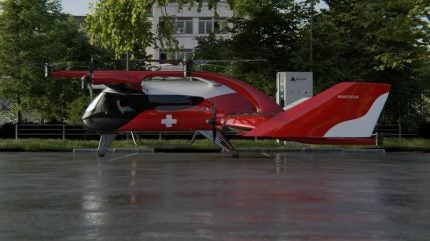

Indian electric aircraft startup ePlane has announced a deal, valued at over $1bn, to supply 788 air ambulances to International Critical-care Air Transfer Team (ICATT) an air ambulance service provider.
The non-binding agreement involves the provision of electric vertical takeoff and landing (eVTOL) aircraft, which will enable the delivery of emergency response services across every district of India.
ePlane, which aims to commence commercial operations by the second half of 2026, plans an initial annual production of 100 units, reported Reuters.
ICATT founder Shalini Nalwad said: “This is going to be a very good solution in terms of organ air-lifts. 95% of the registered patient recipients die before they get an organ. This is purely because of the lack of logistics, not due to lack of donors. This collaboration is going to solve this problem and redefine access to healthcare in India.”
Central to this agreement is the e200x eVTOL, which features rooftop take-off capabilities and can transport patients seven times quicker than ground vehicles.
The aircraft is expected to have a starting range of approximately 110km, with potential expansion to over 200km.
Access the most comprehensive Company Profiles
on the market, powered by GlobalData. Save hours of research. Gain competitive edge.

Company Profile – free
sample
Your download email will arrive shortly
We are confident about the
unique
quality of our Company Profiles. However, we want you to make the most
beneficial
decision for your business, so we offer a free sample that you can download by
submitting the below form
By GlobalData
It will accommodate a pilot, a paramedic, and one patient, along with necessary medical equipment.
ePlane Company founder Satya Chakravarthy: “This collaboration is a monumental step in expanding aerial medical services. Faster airlifts will bridge the gap between accident sites and medical facilities—reducing fatalities and improving accessibility.”
So far, ePlane has secured $20m in investment and intends to initiate the project with three ambulance prototypes.
Chakravarthy, who is also a professor at the Indian Institute of Technology-Madras where ePlane was incubated, highlighted the need for an additional $100m to develop more prototypes, achieve type certification, and start commercial production.
ePlane, with a portfolio of patents, has achieved Design Organisation Approval (DoA) from India’s Directorate General of Civil Aviation (DGCA) for its electric aircraft design.
This design utilises vertical rotors to improve lift, enabling longer flights at reduced speeds.
Established in 2019, ePlane’s team comprises over 100 professionals. The company is currently conducting trials on a cargo aircraft intended for use in urban areas.
Concurrently, ePlane is progressing with the detailed engineering and regulatory assessments of its air taxi, which is slated to begin in the 2024 fiscal year.
The air taxi will initially be operated by pilots, with plans to shift to autonomous operations as regulatory conditions permit.






